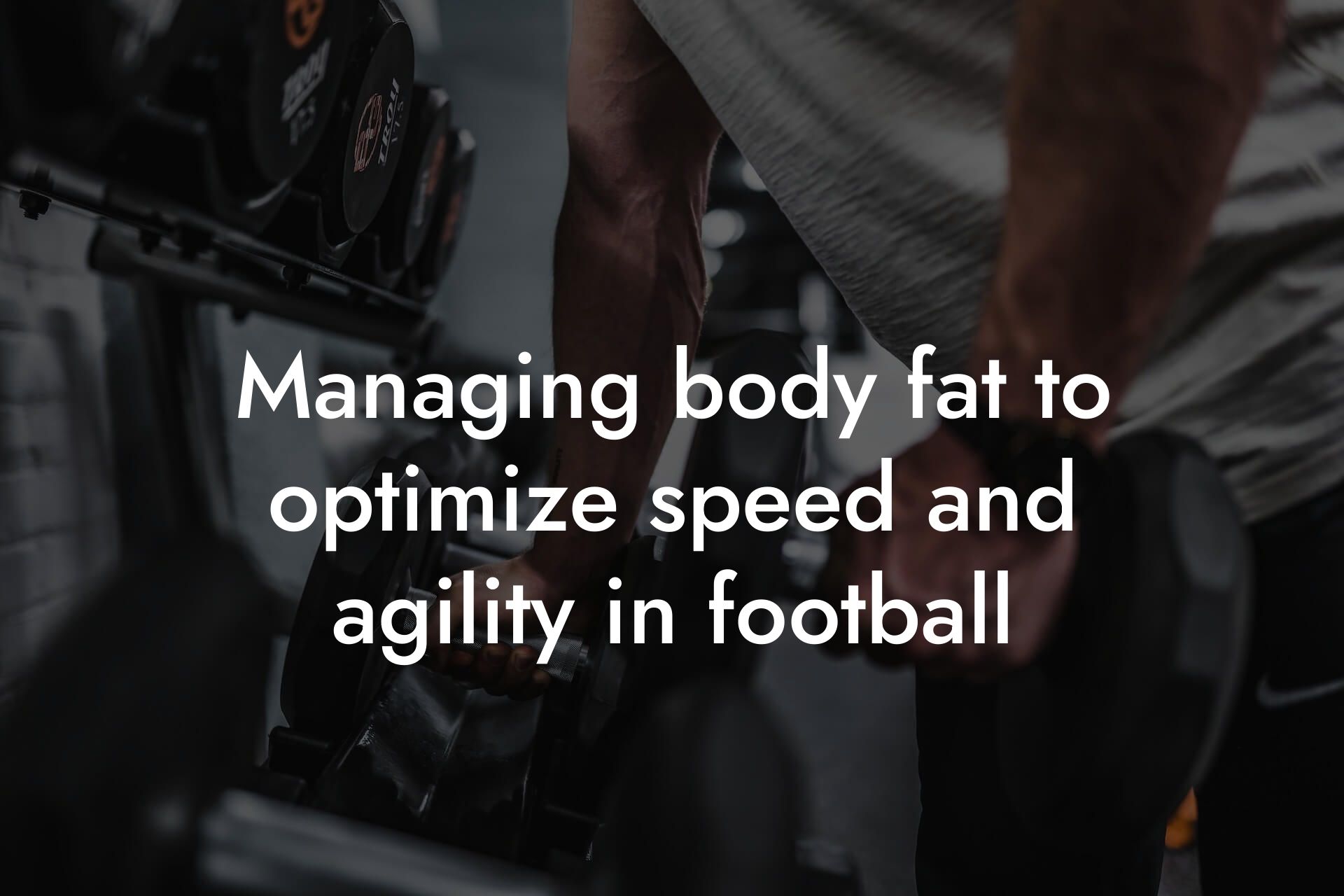As a football player, having a strong and powerful physique is crucial to dominating on the field. Strength training is an essential component of any football player's workout routine, and when done correctly, can significantly improve performance and reduce the risk of injury. At Tano Performance Group, we understand the importance of strength training for football players, and we're here to provide you with the tips and guidance you need to take your game to the next level.
Table of Contents
- Understanding the Importance of Strength Training for Football Players
- Setting Strength Training Goals for Football Players
- Essential Exercises for Football Players
- Periodization and Progressive Overload
- Incorporating Plyometrics and Agility Training
- Flexibility and Mobility Training
- Nutrition and Recovery for Football Players
- Body Composition Analysis for Football Players
- Frequently Asked Questions
Understanding the Importance of Strength Training for Football Players
Football is a physically demanding sport that requires a combination of strength, power, speed, and agility. Without adequate strength, football players may struggle to explosively accelerate, decelerate, and change direction quickly, making them more susceptible to injury and less effective on the field. Strength training helps to improve muscular power, endurance, and overall athleticism, allowing football players to perform at their best.
Setting Strength Training Goals for Football Players
Before starting a strength training program, it's essential to set specific, measurable, and achievable goals. For football players, goals may include increasing squat strength, improving deadlift power, or enhancing overall muscular endurance. Having clear goals in mind will help guide your training program and ensure you're focusing on the exercises and techniques that will have the most significant impact on your performance.
Essential Exercises for Football Players
A well-rounded strength training program for football players should include a combination of exercises that target different muscle groups and movement patterns. Some essential exercises for football players include:
- Squats: Improves strength and power in the legs, hips, and core.
- Deadlifts: Develops strength and power in the legs, hips, and back.
- Bench Press: Enhances strength and power in the chest, shoulders, and triceps.
- Rows: Improves strength and power in the back, shoulders, and biceps.
- Lunges: Targets the legs, hips, and core, improving balance and stability.
- Step-Ups: Enhances strength and power in the legs, hips, and core, while also improving balance and coordination.
Periodization and Progressive Overload
To continue making gains in strength and power, football players must incorporate periodization and progressive overload into their training program. Periodization involves alternating between periods of intense training and lighter, recovery-based training, while progressive overload involves gradually increasing the weight, reps, or sets over time to continue challenging the muscles. This approach helps to avoid plateaus and ensures continued progress and improvement.
Incorporating Plyometrics and Agility Training
In addition to traditional strength training exercises, football players should also incorporate plyometric and agility training into their workout routine. Plyometric exercises, such as box jumps and depth jumps, help to improve explosive power, while agility drills, such as cone drills and ladder drills, enhance speed, quickness, and change of direction ability.
Flexibility and Mobility Training
Flexibility and mobility training are often overlooked components of a strength training program, but they're essential for football players. Incorporating exercises like leg swings, lunges, and hip circles can help improve range of motion, reduce muscle tension, and enhance overall athletic performance.
Nutrition and Recovery for Football Players
Adequate nutrition and recovery are critical components of any strength training program. Football players should focus on consuming a balanced diet that includes plenty of protein, complex carbohydrates, and healthy fats, while also staying hydrated and getting adequate rest and recovery time. Additionally, incorporating recovery techniques like foam rolling, stretching, and self-myofascial release can help reduce muscle soreness and improve overall recovery.
Body Composition Analysis for Football Players
At Tano Performance Group, we understand the importance of body composition analysis for football players. Our DEXA machine provides a comprehensive body assessment, giving football players valuable insights into their body fat percentage, lean mass, bone density, and more. This information can be used to tailor training programs, optimize nutrition, and enhance overall athletic performance.
By incorporating these strength training tips into your workout routine, you'll be well on your way to dominating on the football field. Remember to set specific goals, focus on essential exercises, incorporate periodization and progressive overload, and prioritize nutrition and recovery. With the right approach, you'll be able to improve your strength, power, and overall athleticism, giving you a competitive edge on the field.
Frequently Asked Questions
What is the importance of strength training for football players?
Strength training is crucial for football players as it enhances their overall performance, power, speed, and endurance on the field. It helps build muscle mass, increases bone density, and improves joint stability, reducing the risk of injuries. A well-structured strength training program can also improve a player's acceleration, deceleration, and agility, giving them a competitive edge over their opponents.
How does strength training improve football performance?
Strength training improves football performance by increasing muscle power, speed, and endurance. It enables players to generate more force, accelerate faster, and sustain their speed over a longer period. Additionally, strength training enhances a player's ability to change direction quickly, making them more agile and elusive on the field.
What are the key muscles to focus on for football players?
The key muscles to focus on for football players include the legs, glutes, core, and upper body. The legs and glutes are essential for generating power and speed, while the core provides stability and balance. The upper body, including the shoulders, chest, and back, is important for tackling, blocking, and overall strength.
What is the best way to structure a strength training program for football players?
A well-structured strength training program for football players should include a combination of exercises that target different muscle groups, such as squats, deadlifts, bench press, and rows. The program should also incorporate plyometric exercises, such as jump squats and box jumps, to improve power and explosiveness. Additionally, it's essential to include exercises that target the core and glutes, such as planks and lunges.
How often should football players strength train?
Football players should aim to strength train at least 2-3 times per week, with a minimum of 48 hours of rest between sessions. This allows for adequate recovery time and prevents overtraining. However, the frequency and intensity of strength training may vary depending on the player's position, experience, and goals.
What is the role of nutrition in strength training for football players?
Nutrition plays a critical role in strength training for football players. A well-balanced diet that includes adequate protein, complex carbohydrates, and healthy fats is essential for muscle growth and recovery. Football players should aim to consume 1.6-2.2 grams of protein per kilogram of body weight daily, spread across 3-5 main meals and 2-3 snacks.
How can football players incorporate plyometric exercises into their strength training program?
Football players can incorporate plyometric exercises, such as jump squats, box jumps, and depth jumps, into their strength training program to improve power and explosiveness. These exercises should be performed 2-3 times per week, with 3-5 sets of 3-5 reps. It's essential to focus on proper technique and landing mechanics to prevent injuries.
What is the importance of core strength for football players?
Core strength is essential for football players as it provides stability, balance, and power. A strong core enables players to generate more force, accelerate faster, and change direction quickly. It also reduces the risk of injuries, particularly in the lower back and hips.
How can football players improve their agility and speed?
Football players can improve their agility and speed by incorporating exercises that target the legs, glutes, and core. Agility drills, such as cone drills and shuttle runs, can also be effective in improving speed and quickness. Additionally, plyometric exercises, such as jump squats and box jumps, can help improve power and explosiveness.
What is the role of flexibility and mobility in strength training for football players?
Flexibility and mobility are crucial in strength training for football players as they enable players to move efficiently and effectively on the field. A well-structured flexibility and mobility program can improve range of motion, reduce the risk of injuries, and enhance overall performance.
How can football players incorporate strength training into their off-season program?
Football players can incorporate strength training into their off-season program by focusing on exercises that target different muscle groups, such as squats, deadlifts, and bench press. The off-season is an ideal time to focus on building strength, power, and endurance, which can be translated to improved performance on the field.
What are the benefits of strength training for injury prevention in football players?
Strength training is essential for injury prevention in football players as it helps build muscle mass, increases bone density, and improves joint stability. A well-structured strength training program can reduce the risk of injuries, particularly in the legs, hips, and lower back.
How can football players incorporate strength training into their in-season program?
Football players can incorporate strength training into their in-season program by focusing on exercises that target different muscle groups, such as squats, deadlifts, and bench press. The in-season program should be less intense and focused on maintaining strength, power, and endurance, rather than building it.
What is the importance of proper warm-up and cool-down in strength training for football players?
Proper warm-up and cool-down are essential in strength training for football players as they help prevent injuries, improve performance, and enhance recovery. A well-structured warm-up should include exercises that target different muscle groups, such as leg swings, arm circles, and torso twists. The cool-down should include stretching exercises to improve flexibility and reduce muscle soreness.
How can football players track their progress in strength training?
Football players can track their progress in strength training by monitoring their weight, body fat percentage, and performance metrics, such as squat, deadlift, and bench press max. They can also use wearable technology, such as GPS trackers and heart rate monitors, to track their progress and optimize their training program.
What is the role of recovery in strength training for football players?
Recovery is critical in strength training for football players as it enables them to repair and adapt to the demands of training. Adequate recovery time, including 48-72 hours of rest between sessions, is essential for muscle growth, repair, and adaptation. Additionally, football players should prioritize sleep, nutrition, and stretching to enhance recovery.
How can football players incorporate strength training into their daily routine?
Football players can incorporate strength training into their daily routine by prioritizing exercises that target different muscle groups, such as squats, deadlifts, and bench press. They can also incorporate strength training into their daily activities, such as using resistance bands or bodyweight exercises during commercial breaks while watching TV.
What are the benefits of working with a personal trainer or strength coach for football players?
Working with a personal trainer or strength coach can be beneficial for football players as they provide customized training programs, correct technique, and motivation. A personal trainer or strength coach can also help football players develop a well-structured training program that targets specific muscle groups and improves overall performance.
How can football players incorporate strength training into their team training program?
Football players can incorporate strength training into their team training program by working with their coaches and trainers to develop a well-structured training program that targets specific muscle groups and improves overall performance. The team training program should include exercises that target different muscle groups, such as squats, deadlifts, and bench press, as well as plyometric exercises and agility drills.
What are the benefits of incorporating strength training into a youth football player's training program?
Incorporating strength training into a youth football player's training program can be beneficial as it helps build muscle mass, increases bone density, and improves joint stability. It also enhances overall performance, reduces the risk of injuries, and provides a competitive edge over opponents.
How can football players maintain their strength training program during the off-season?
Football players can maintain their strength training program during the off-season by focusing on exercises that target different muscle groups, such as squats, deadlifts, and bench press. They should also prioritize nutrition, recovery, and flexibility exercises to maintain their overall fitness and performance.
What are the benefits of incorporating strength training into a football player's rehabilitation program?
Incorporating strength training into a football player's rehabilitation program can be beneficial as it helps build muscle mass, increases bone density, and improves joint stability. It also enhances overall performance, reduces the risk of re-injury, and provides a competitive edge over opponents.
How can football players incorporate strength training into their lifestyle?
Football players can incorporate strength training into their lifestyle by prioritizing exercises that target different muscle groups, such as squats, deadlifts, and bench press. They should also prioritize nutrition, recovery, and flexibility exercises to maintain their overall fitness and performance. Additionally, football players can incorporate strength training into their daily activities, such as using resistance bands or bodyweight exercises during commercial breaks while watching TV.
Here are some related articles you might love...
- The role of bone density in preventing football injuries
- Managing body fat to optimize speed and agility in football
- Nutrition strategies for maintaining muscle mass during the football season
- Recovery strategies for football athletes: Nutrition and rest
- Balancing mass and speed: A guide for football athletes
- How DEXA scans can benefit professional football players
- How to maintain peak performance during the football season
- The importance of body composition in football performance
- Off-season fitness programs for football players
Zak Faulkner
Zak Faulkner is a leading authority in the realm of physical health and body composition analysis, with over 15 years of experience helping professionals optimise their fitness and well-being. As one the experts behind Tano Performance Group, Zak has dedicated his career to providing in-depth, science-backed insights that empower clients to elevate their physical performance and overall health.
With extensive knowledge of DEXA technology, Zak specializes in delivering comprehensive body assessments that offer precise data on body fat, muscle mass, bone density, and overall physique. His expertise enables individuals to make informed decisions and achieve their fitness goals with accuracy and confidence. Zak’s approach is rooted in a deep understanding of human physiology, combined with a passion for helping clients unlock their full potential through personalised strategies.
Over the years, Zak has earned a reputation for his commitment to excellence, precision, and client-focused service. His guidance is trusted by top professionals who demand the best when it comes to their health. Whether advising on fitness programs, nutritional strategies, or long-term wellness plans, Zak Faulkner’s insights are a valuable resource for anyone serious about taking their health and fitness to the next level.
At Tano Performance Group, Zak continues to lead our Content Team revolutionising how professionals approach their physical health, offering unparalleled expertise that drives real results.




